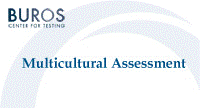Buros-Nebraska Series on Measurement and Testing

Multicultural Assessment in Counseling and Clinical Psychology
Date of this Version
1996
Document Type
Book Chapter
Citation
Published in Multicultural Assessment in Counseling and Clinical Psychology, edited by Gargi Roysircar Sadowsky and James C. Impara (Lincoln, NE: Buros Institute of Mental Measurements, University of Nebraska–Lincoln, 1996).
Abstract
In recent years counseling programs have devoted increasing attention to multicultural issues in the curriculum. The counseling profession's initial interest in multicultural training (or development) was buoyed by the Division of Counseling Psychology (Division #17 of the American Psychological Association [APA]) position paper on multicultural competencies (Sue et al., 1982). This position paper delineated 11 cross-cultural counseling competencies organized within the categories of awareness (beliefs/attitudes), knowledge, and skills.
The Awareness category refers to the counselor's awareness of his or her own value biases and how these biases may translate into culturally insensitive counseling; to the need to check biases and stereotypes; and to the need to develop a positive orientation towards multiculturalism. Knowledge refers to the counselor's knowledge of his or her own worldview as well as the worldview of his or her clients; and to additional culture- specific information such as the impact of racism on clients, models of acculturation and racial identity development, and so forth. Finally, Skills refers to the counselor's ability to translate awareness and knowledge into culturally sensitive and relevant interventions (Pedersen, 1988; Sue et al., 1982; Sue, Arredondo, & McDavis, 1992).
Since the Sue et al. (1982) position paper was published, numerous professional preparation programs have added multicultural components to their curriculum. According to the Hollis and Wantz (1990, 1994) national surveys of counseling programs, 76 new multicultural courses were developed and added to existing curriculums from 1989 to 1991, and another 27 programs added a course from 1993 to 1995. In a survey of APA-accredited counseling psychology programs, Hills and Strozier (1992) found that 87% of the programs offered a multicultural course, and 59% of the programs required the course. Also surveying APA-accredited counseling psychology programs, Quintana and Bernal (1995) found that 73% of the programs offered at least one multicultural course and 42% required one course. In the most recent survey to date, of both APA accredited and non-accredited counseling psychology programs, Ponterotto (in press) found that 89% of responding programs have a required multicultural counseling course, and 58% of programs integrate multicultural issues into all courses.


Comments
Copyright © 1996 by Buros Institute of Mental Measurements. Digital edition copyright © 2012 Buros Center for Testing.